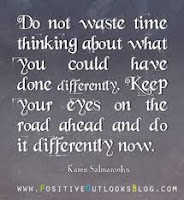They say there are only two reasons for looking back:
- to check the rear view mirror when driving, and
- to see how much progress you have made on your journey through life.
Oh, and to see if you're being followed, like when you’re walking alone down a dark alley or in a parking structure. So, I guess there are three reasons for looking back.
Lately, as I’ve been searching for a direction in life, I end up with a lot of down, alone time where I find myself involved with my not-so-favorite pastime; overthinking.
It seems I’ve been overthinking past conversations I would have, could have or should have handled differently at the time. Or conversations I imagine having should the opportunity arise in the future. I like to call them “conversations after the fact.” Also known as “why didn’t I think of that at the time?” moments.
A recent conversation with a friend around a semi-sensitive subject has triggered this revelation.
It also triggered painful memories of other difficult conversations, not only with him, but with others, around this sensitive subject.
His question was very innocent as I know he was coming from a place of caring and I understand we have differing views on this and many other subjects.
I now live a very different life than most people so I understand my choices might not resonate with many others. But for the most part, I'm comfortable with my choices and that's all that matters.
Yet, I find myself wanting to revisit this conversation with him to clarify any misconceptions I might have left with my friend.
But, will it matter? Probably not. Will he have remembered this conversation? Again, probably not. Could there even have been a misinterpretation in the first place? Most likely not, as he saw things through his viewpoint and I expressed myself through mine. Is he sitting at home wondering if he misunderstood me or thinking of what he woulda, coulda, or shoulda said differently in case he believes he said something wrong? Most definitely not.
Revisiting the past with others isn’t always effective. Sure, it can mend fences or fix misunderstandings but sometimes it doesn’t. If this is my life and I know what I meant even if I didn’t verbalize it perfectly, does it really matter? No.
In many cases, looking at the wouldas, couldas and shouldas might trigger one more thing. Regret. I regret how I said what I said. But what does this regret trigger in me? Maybe a feeling of being misunderstood? Of not having said exactly what I wanted to say? Of wondering how my friend perceives or accepts me? A sense of having to defend my unconventional choices? Who knows?
I also find myself looking at other potential conversations involving different people I might have to face in the future where past misunderstandings have lead to a breach of trust.
In these cases, I’ll just be prepared should I encounter these individuals in the future provided I remember then what I want to say now.
Either way, overthinking these conversations triggers anxiety in anticipation of potential future encounters with these people.
So, what to do when I find myself in these mental conversations?
When I realize I’m think-talking to myself again, I try to bring my focus back to the moment. If I’m washing dishes, I focus on the water and suds and how they dance across the plate or bowl. If I’m walking outside, I focus on the plants and the texture of the leaves or the bark of the trees. If I’m doing something around the house, I put my energy and attention into whatever it is I’m doing. If I'm listening to music, I focus on the lyrics. Eventually, the anticipated conversation has drifted away.
If I’m trying to fall asleep, well, then I’m in trouble. I try a self-relaxation technique where I start to focus on my breath for a while, feeling it as I inhale, then as I exhale, inhale, exhale, over and over. Later, I focus on my feet and feel how heavy they are. Then my calves, up my legs to my abdomen and so on. It does work most of the time.





